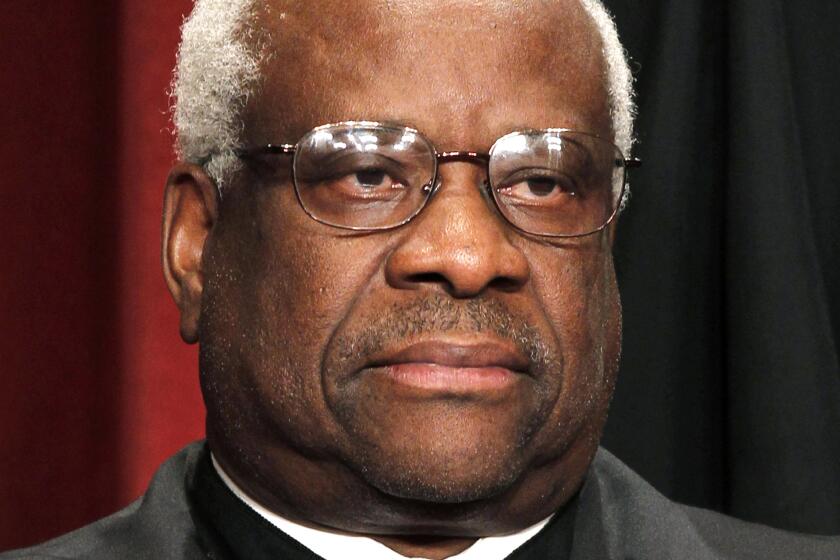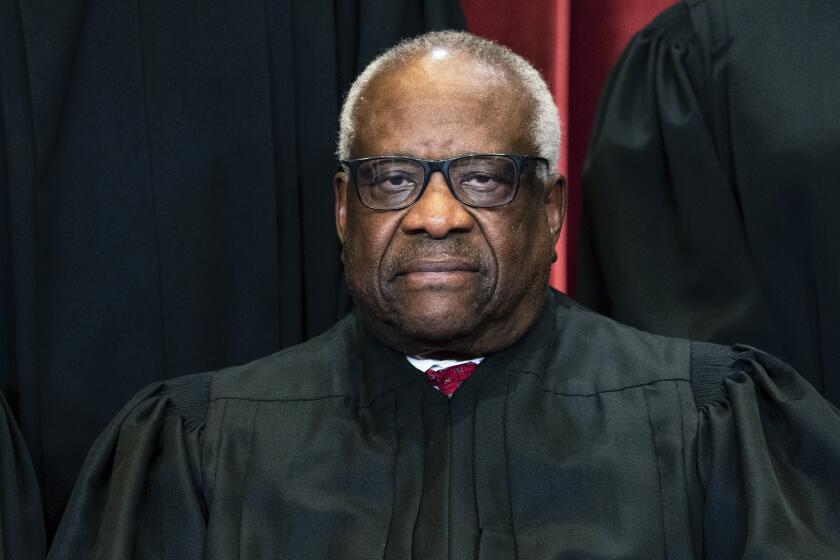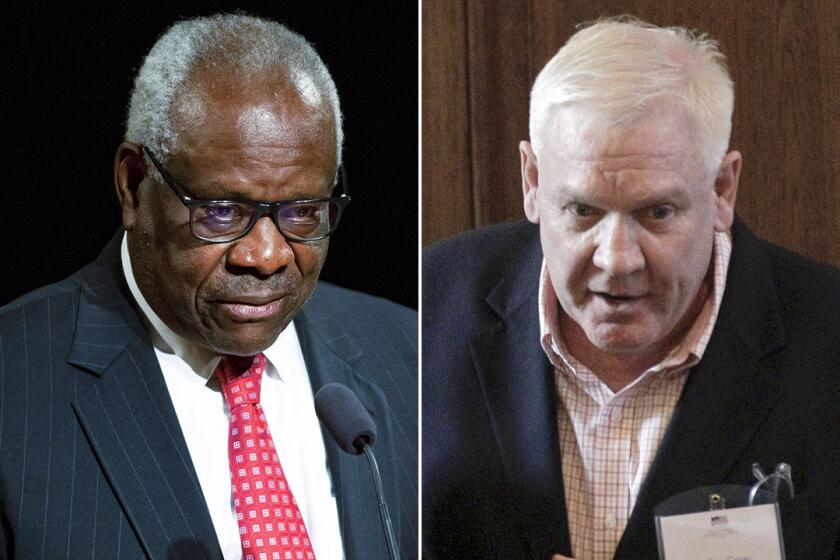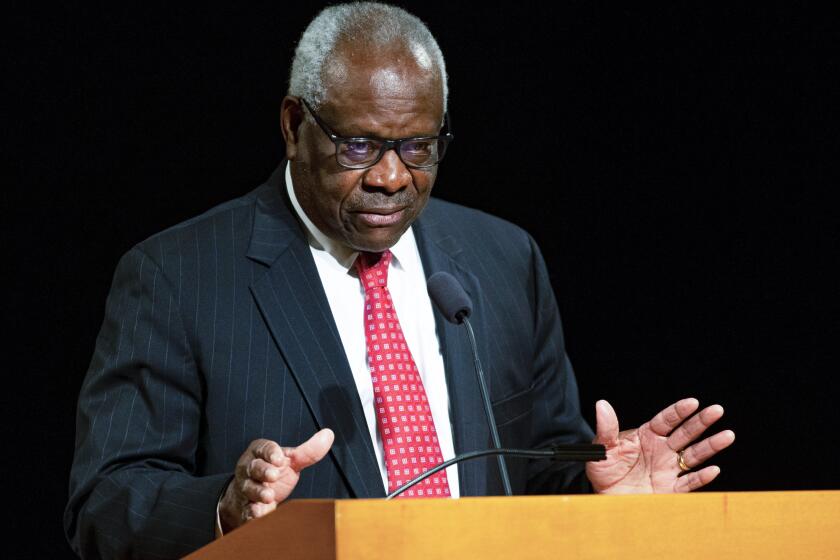Chief Justice Roberts declines Senate panel’s request to testify on Supreme Court ethics
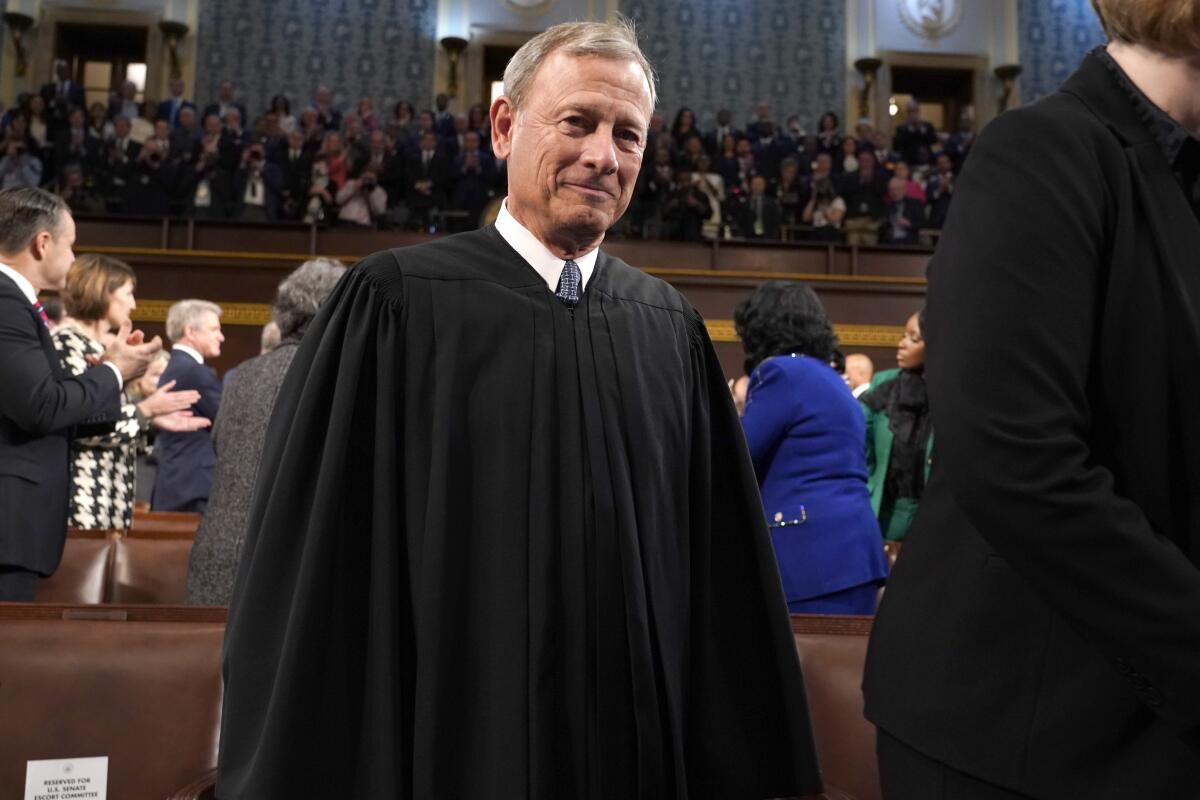
- Share via
WASHINGTON — Chief Justice John G. Roberts Jr. has declined a request from the Senate Judiciary Committee to testify at a hearing next week on the U.S. Supreme Court’s ethical standards, instead providing the panel with a statement of ethics reaffirmed by the court’s nine justices.
Senate Judiciary Committee Chairman Richard J. Durbin (D-Ill.) had invited Roberts’ testimony last week, saying that there had been a “steady stream of revelations” regarding justices “falling short of ethical standards expected of other federal judges.”
The invitation came after news reports that detailed a close relationship between Justice Clarence Thomas and a conservative donor from Texas. The donor, Dallas billionaire Harlan Crow, had purchased three properties belonging to Thomas and his family in a transaction worth more than $100,000 that Thomas never reported, according to the nonprofit investigative journalism organization ProPublica.
A 2004 Los Angeles Times report disclosed gifts to Justice Thomas from rich Texan Harlan Crow. In response, Thomas stopped disclosing them.
In a letter to Durbin on Tuesday, Roberts said he would “respectfully decline” the committee’s request, noting: “Testimony before the Senate Judiciary Committee by the Chief Justice of the United States is exceedingly rare, as one might expect in light of separation of powers concerns and the importance of preserving judicial independence.”
Accompanying his letter to Durbin was a “Statement on Ethics Principles and Practices” signed by all nine justices, describing the ethical rules they follow about travel, gifts and outside income. While the rules are not new, the statement said that the undersigned justices “today reaffirm and restate foundational ethics principles and practices to which they subscribe in carrying out their responsibilities as Members of the Supreme Court of the United States.”
The statement details standards for justices’ activities outside the court and describes the recusal process, which is generally up to each individual justice. It does not require justices to explain why if they recuse themselves from a case.
Nothing about Roberts’ letter or the statement attributed to all nine justices suggests that they feel chastened by recent reports. But it is the first time the current membership has spoken on ethics issues as a group.
After ProPublica disclosed his lavish trips courtesy of GOP donor Harlan Crow, the Supreme Court justice says he’ll follow clarified rules and disclose some of the value of future trips.
Durbin said in a statement that he was surprised by the court’s response, because it “suggests current law is adequate and ignores the obvious.”
“The actions of one Justice, including trips on yachts and private jets, were not reported to the public,” Durbin said. “That same Justice failed to disclose the sale of properties he partly owned to a party with interests before the Supreme Court.”
Durbin said he would proceed with the hearing, which would “review common sense proposals” to hold justices more accountable to ethics guidelines.
Gabe Roth, executive director of the transparency group Fix the Court, said the justices’ statements rehashed inadequate ethical standards.
“Make no mistake: Roberts’ statement is nowhere near an appropriate response to the ethical failures of the current Court,” Roth said in a statement.
ProPublica reported on Thomas’ undisclosed private jet and yacht trips, now it says he failed to disclose real estate transactions. Who will hold him accountable?
ProPublica also revealed that Crow gifted Thomas and his wife, conservative activist Ginni Thomas, with hundreds of thousands of dollars’ worth of annual vacations and trips over several decades — including international cruises on his mega-yacht, private jet flights and stays at Crow’s invitation-only resort in New York’s Adirondacks. But the 2014 real estate deal is the first public record of a direct financial transaction between Crow and Justice Thomas.
Ethics experts have offered conflicting views about whether Thomas was required to disclose the luxury trips funded by Crow. Thomas said in a statement that he was advised by colleagues that “this sort of personal hospitality from close personal friends, who did not have business before the Court, was not reportable.”
Thomas did not name the justices or those in the judiciary with whom he had consulted.
How hard could it be for Clarence Thomas, the longest-serving Supreme Court justice, to figure out how to follow financial disclosure law?
Last month, the federal judiciary bolstered disclosure requirements for all judges, including Supreme Court justices — but overnight stays at personal vacation homes owned by their friends remain exempt from disclosure.
The ethics statement Thomas sent to Durbin notes that the Judicial Conference’s Committee on Financial Disclosure had “provided clarification on the scope of the ‘personal hospitality’ exemption to the disclosure rules.”
Durbin’s original letter had asked that Roberts or another justice appear before the committee on May 2. He told Roberts that the scope of the testimony would be limited to the ethics rules governing justices of the Supreme Court and potential changes to those rules.
Roberts’ refusal to testify is the latest hitch for Democrats on the Judiciary Committee. With Democratic Sen. Dianne Feinstein of California absent indefinitely, the committee has an equal number of Democrats and Republicans, preventing it from moving certain judges to the Senate floor for confirmation votes — and presumably from subpoenaing Roberts.
In declining to testify, Roberts also ignored Durbin’s invitation to have another justice appear instead. The last time justices met with the Senate Judiciary Committee was in October 2011, when then-Justices Antonin Scalia and Stephen G. Breyer testified.
Associated Press writer Kevin Freking contributed to this report.
More to Read
Get the L.A. Times Politics newsletter
Deeply reported insights into legislation, politics and policy from Sacramento, Washington and beyond. In your inbox twice per week.
You may occasionally receive promotional content from the Los Angeles Times.
